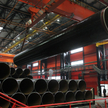PKN Orlen is the partner of the report
– "We want to be a future-oriented company, one that transforms and develops not only in Poland, but also at the global level" - says Daniel Obajek, CEO of PKN Orlen, while presenting a part of the company's new strategy, which is achieving carbon emission neutrality by 2050.
Breakthrough strategy
– "The presented strategy of carbon emission neutrality is a breakthrough document that defines our approach to business in the coming decades" - says the President. – "The global energy transformation that is happening right in front of our eyes is a great opportunity for development for Central Europe. As the largest company in the region, we want to become even more involved in this process and we have compelling reasons to do so. In recent years, we have not only been actively developing new business areas, but we are also a leader in the consolidation of the Polish energy and fuel sector" - he emphasizes.
The reduction in CO2 emissions will be introduced in stages and will involve production processes, as well as the products themselves, manufactured by all companies within the group, including the Energa energy company. The objective for the first stage is to reduce CO2 emissions from refining assets by 20%, and in the energy sector - by 33%, by 2030. PLN 25 billion in investments
























